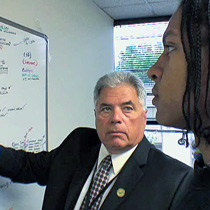2009-8-19
This is the VOA Special English Education Report.
The United States has lost almost seven million jobs since the recession began in December of two thousand seven. The good news: the central bank says economic activity appears to be "leveling out."
The bad news: no one knows when the job market will recover.
These days, if a job is available, young people often have to compete with more experienced workers. The situation is worst for those with the least education.
About thirty percent of workers age sixteen to twenty-four with less than a high school diploma were unemployed last month. That was more than three times the national unemployment rate. The Labor Department says even among high school graduates, twenty-one percent of those with no college were jobless.
 |
| Salvatore Mastroeni is the director of the One-Stop Career Center in Hackensack, New Jersey |
Counselors at the One-Stop Career Center in Hackensack have found jobs for a few hundred young people this summer.
The jobs are twenty hours a week through this month. The pay is seven dollars and twenty-five cents an hour -- the federal minimum wage.
Those chosen must come from poor families and must also face at least one barrier to getting a job. For example, they must have left school or been in trouble with the law.
Sixteen-year-old Nahdir Gonzalez left school last year.
NAHDIR GONZALEZ: "I want a job because I don't want to get in any trouble, I want to stay away from the streets, keep my head on my shoulders, stay on the right path so I can be successful in life."
The director of the program is Salvatore Mastroeni, a former principal of a high school.
SALVATORE MASTROENI: "There's going to be next steps for you after you leave this program. Hopefully, in September or October we might be able to begin either a GED program for you, connecting you then with a college, with a transition program for career pathways."
Many colleges and employers will accept what is known as a GED as the equivalent of a high school diploma.
Salvatore Mastroeni often drives from Hackensack to nearby Englewood. There, he has placed young workers in the recreation department and other local government jobs.
SALVATORE MASTROENI: "Mayor's office, schools, any public entity where youngsters can gain workforce readiness skills."
Twenty-year-old Desirae Somerville is working in a school office and also helping out at the recreation center.
DESIRAE SOMERVILLE: "They have me down at Liberty School, working with other children. We're fixing up the classrooms, painting and doing inventory."
REPORTER: "What would you be doing this summer now if it weren't for this job?
DESIRAE SOMERVILLE: "I'd probably be home now sleeping, or looking for another job."
And that's the VOA Special English Education Report. I'm Steve Ember.
___
Includes reporting by VOA's Carolyn Weaver